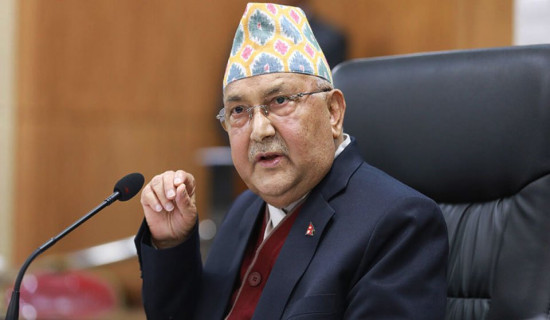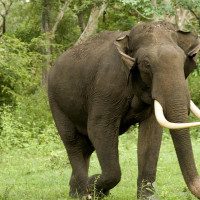- Friday, 27 June 2025
Sanskrit is now a global asset, says President
By A Staff Reporter, Kathmandu, June 27: President Ramchandra Paudel has said that Sanskrit is no longer confined to Nepal and India, it has now become a global asset.
Addressing the 19th World Sanskrit Conference that kicked off here on Thursday, President Paudel said that Sanskrit language, literature, and culture, which have had a deep influence in South Asia, have now extended globally.
He said, “The future of Sanskrit appears promising with its use in computers and AI. Today’s impatient global society seeks hope and trust from the Sanskrit literature.”
Citing a verse from the Upanishad “This entire universe is filled with consciousness, indulge it with a sense of renunciation. Do not be attached to or greedy for wealth and riches’, the President said that the conference should convey a message of peace, cooperation, and coexistence to the present world, which is entangled in the horrors and terror of war.
He further emphasised that the protection and development of the Earth, humanity, and civilisation, as well as the attainment of happiness and contentment, are possible not through war, but through peace, compassion, and friendship.
Stating that Nepal has also been working towards the preservation and development of Sanskrit, the President said, “But it is insufficient, and much more remains to be done.”
“Just as in the economics monopolies take place when development is at the peak, at the height of Sanskrit’s development, elites imposed restrictions preventing Dalits and others from speaking and learning the language, thereby preventing it from becoming a spoken language,” he added.
He emphasised the need to make Sanskrit a language of the people.
He said that since ancient times, Nepal has been the birthplace of many sages and seers. “In this sacred land, sage Yajnavalkya had the vision of the mantras of the Shukla Yajur Veda, and both the early life of Valmiki and the birth of Vedavyasa took place here.”
President Paudel highlighted that Rajarshi Janak, Buddha, the messenger of peace, Panini, and Baba Gorakhnath are the fragrances of this very land, stating, “Nepal is an ancient nation with an unbroken history of two thousand five hundred years. The mention of the word ‘Nepal’ in the Atharva Veda, and the references in numerous ancient texts such as Puranas, Tantras, Smritis, Ayurveda, Kautilya’s Arthashastra, among others, reveal Nepal’s antiquity, its commitment to the eternal Vedic tradition, peace-loving nature, tolerance, and harmonising character.”
He said that more than 200 engraved inscriptions and records confirm that Sanskrit was the official language during the Lichchhavi period
“This proves that Nepal is not only the birthplace of Sanskrit but also a fertile ground for its flourishing,” he added.
Likewise, Minister for Culture, Tourism and Civil
Aviation, Badri Prasad Pandey said that the 19th World Sanskrit Conference, currently underway in Kathmandu,
as an auspicious sign of the renaissance of culture
and a proud opportunity for Nepal.
Addressing the conference, Minister Pandey said that the Sanskrit language in
Nepal is not merely a language but a foundation of
governance, literature, philosophy of life, and social structure.
Highlighting the natural elements of Nepal, its mountains, rivers, hills,
and climate he said, “The air, hills, rivers, and mountains of Nepal themselves are sources of inspiration for spiritual practitioners.
The entire environment of Nepal radiates the energy of spiritual practice.”
Minister Pandey said the remarkable participation of chancellors and vice-chancellors from more than 20 universities around the world, as well as scholars from various disciplines, describing the event as a ‘Mahakumbha’ of Eastern knowledge and Vedic philosophy.
During his address, he invited international
delegates to visit Nepal’s sacred sites, where the echoes
of Vedic mantras can still be heard.















